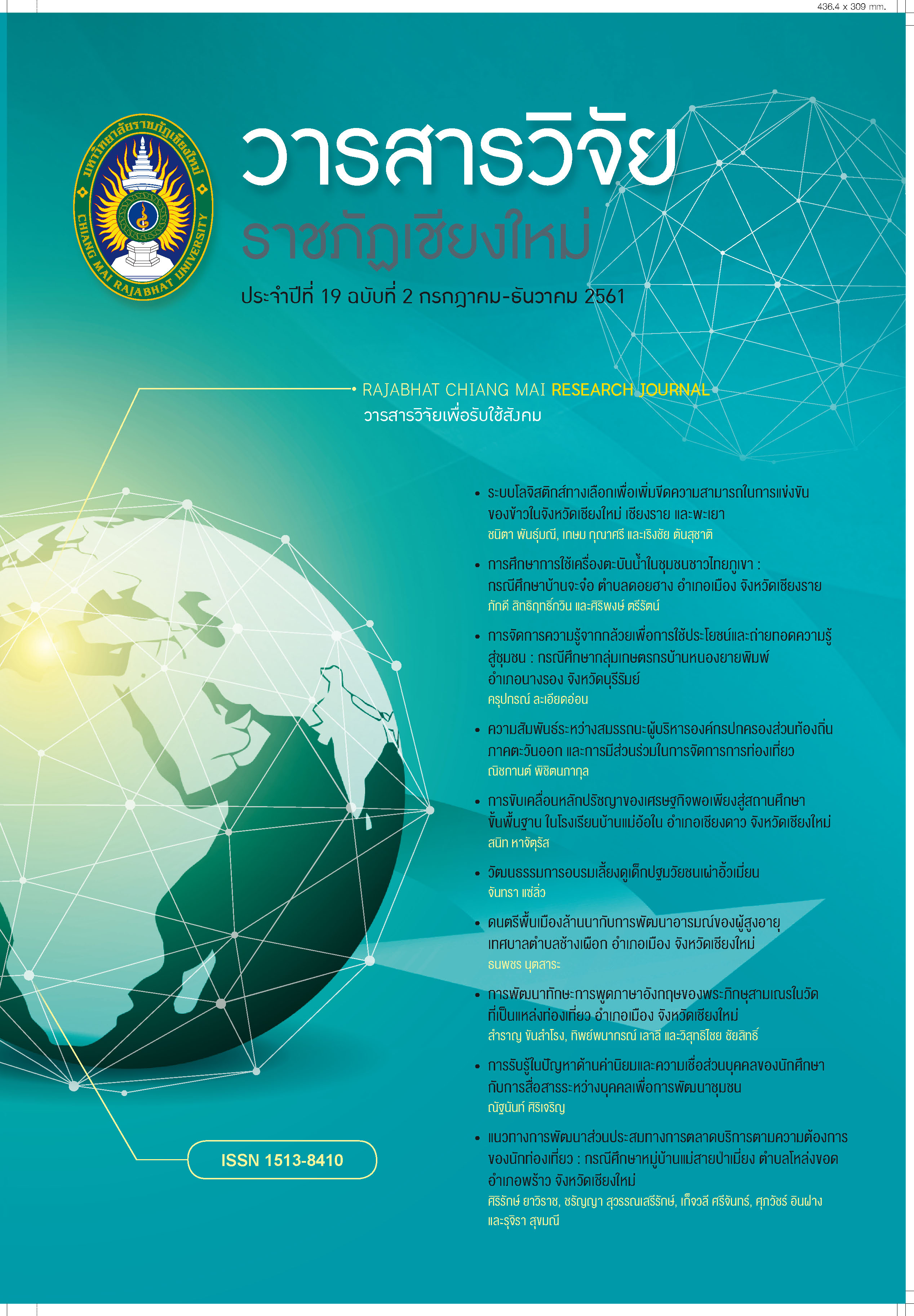Competency of Leaders in the Eastern Region Local Administrative Organization and Participation for Tourism Management
DOI:
https://doi.org/10.14456/rcmrj.2018.140131Keywords:
Competencies of Eastern Region Local Administrative Organization, Participation in tourism managementAbstract
This study aims to explain the relation between competencies of leaders in the Eastern Region Local Administrative Organization (LAO) and participation with tourism management at the overview level. Quantitative and qualitative data analysis are use. The quantitative data was gathered through questionnaire from 7 provincial leaders comprising Chanthaburi, Chonburi, Trat, Rayong, Prachinburi, Sa Kaeo, and Chachoengsao. Beside, the qualitative data was compiled through in-depth interview with personnel having significant roles in tourism management in the eastern region, and stakeholders.
The findings revealed that self-assessment scores among leader competency topics show relative high scores in personal-related topics including understanding others, leadership, teamwork and service orientation, while, the criteria of achievement orientation, developing others, and Initiative gained moderate scores. Moreover, analysis on relation among each score and participation with tourism management found that competency topics related to participation directly, and gained high score, consisting of understanding others, leadership and teamwork. While the topics related to participation directly, but gained moderate score, including achievement orientation and Initiative.
The author suggests that the leaders in the Eastern Region LAO should maintain the competency of understanding others, leadership and teamwork which are significant factors for regional tourism enhancement resulting from participation among LAO and relevant agencies. While, the policy makers should enhance understanding and awareness on achievement orientation for LAO leaders. Additionally, they should encourage leaders to gain initiative competency to allow participation in tourism management, not only just participation, but also truly drive goals achievement.
Downloads
References
สำนักพัฒนาขีดความสามารถในการแข่งขันทางเศรษฐกิจ สำนักงานคณะกรรมการพัฒนาการเศรษฐกิจและสังคมแห่งชาติ. (2561). โครงการจัดทำแผนที่เครือข่ายวิสาหกิจ (Cluster Mapping) เพื่อยกระดับความสามารถในการแข่งขัน. สืบค้นจาก https://cm.nesdb.go.th/
Boyatzis, R. E. (1999). Clustering competence in emotional intelligence: Insights from the emotional competence inventory (ECI). สืบค้นจาก https://www.ei.haygroup.com/resources/ Library_articles
Goleman, D. (1998). Working with emotional intelligence. New York: Bantam Books.
Hellriegel, D., Slocum, J. W., & Woodman, R. W. (2001). The management of organizational behavior. California: Prentice Hall.
Rosier, R. H. (Ed.). (1994). The competency model handbook: Volume 1-4. Lexington. MA: Linkage.
Spencer, L. M., & Spencer, S. M. (1993). Competence at work: Models for superior performance. New York: Wiley.
Yamane, Taro. (1973). Statistics: An Introductory Analysis. 2rd ed. New York: Harper. And Row.
Zwell, M. (2000). Creating a culture of competence. New York: John Wiley.
Downloads
Published
How to Cite
Issue
Section
License
1. Articles, information, content, images, etc published in the “Community and Social Development Journal” are copyrighted by the Community and Social Development Journal, Chiang Mai Rajabhat University. In order to properly distribute the articles through print and electronic media, the authors still hold the copyright for the published articles under the Creative Commons Attribution (CC BY) license, which allows the re-distribution of the articles in other sources. References must be made to the articles in the journal. The authors are responsible for requesting permission to reproduce copyrighted content from other sources.
2. The content of the articles appearing in the journal is the direct responsibility of the article authors. The editorial board of the journal does not necessarily agree with or share any responsibility.














